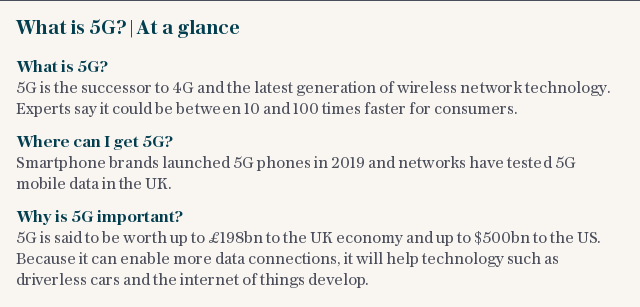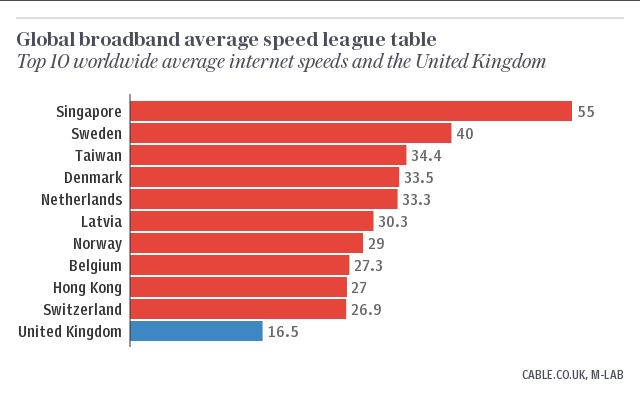Huawei 5G ban: The questions that still need to be answered

After months of speculation, today finally brought some clarity on what the future could look like for the Chinese giant Huawei in the UK.
Standing up in the House of Commons, Culture Secretary Oliver Dowden confirmed that Britain would be banning Huawei from its next-generation 5G networks.
Telecoms operators will be blocked from buying any new kit from the company after the end of this year and they will be required to rip out any existing Huawei equipment within the next seven years.
The National Security Council took the decision after the impact of US sanctions raised concerns about Huawei's continued involvement in the UK's 5G infrastructure.
But, whilst the Government gave broad outlines for its plans for the Chinese firm, there remain several unanswered questions.

Who will foot the bill?
Stripping Huawei out of the UK's networks could be extremely costly. Mr Dowden himself admitted it could cost as much as £2bn to completely remove the Chinese firm, which is deeply embedded in the infrastructure.
Huawei provided kit for 3G and 4G networks, as well as 5G equipment which is already being installed across the UK.
Mr Dowden's comments echoed those from operators in recent weeks, who warned of the huge cost they would incur in ripping out and replacing things such as base-stations and antennas.
It remains unclear who would pay for this. Concerns have emerged that the £2bn cost could be passed on to consumers, although at least one operator has said this would be a last resort.
As an alternative, telecoms companies have been pushing for some sort of compensation package, and earlier this week, The Telegraph revealed that networks were urging the Government to drop prices at the November 5G auction.
However, experts have warned this would be tricky to do, and that companies may instead have to ask regulator Ofcom for a reduction.
Matthew Howlett, of industry data firm Assembly, said: “Ofcom are keen to point out that they're independent of the Government and their approach to licencing spectrum is based on economics and awarding a scarce resource."

What is going to happen to fixed broadband networks now?
Much of the discussion over the past year has centered around Huawei’s role in Britain’s mobile networks, but this is not the only place where Huawei kit is used.
The company also plays a major role in fixed line technology, or broadband kit. Around half of BT’s fibre equipment is supplied by Huawei, and the company is a key supplier of things such as roadside cabinets, which link buildings and houses to the internet.
An announcement on Huawei's presence in broadband networks had been expected with Enders Analysis’ James Barford saying that "if you have genuine security concerns, then presumably those should apply to fixed line as well as 5G".
He was right. The Government today said it would be launching a consultation into Huawei's role in fibre and older networks. "We will need to take a different approach to full fibre and older networks," Dowden said, saying they were "different in terms of technology, security and the vendors supporting them".
Full fibre operators have been advised to "transition away" from purchasing new Huawei equipment. We still don't know the exact transition timetable, but the Government says it will take no longer than two years. Whether this is viable and how much it could cost remains to be seen.
What about mobile phones?
Estimates suggest Huawei is the third largest mobile phone provider in the UK, behind Apple and Samsung, and it has been ramping up this part of the business in recent years. In 2018, more than 2.5 million Huawei mobiles were sold in Britain and, a few years ago, it was even eyeing up a store opening on Oxford Street in London.
Under existing proposals, there is not thought to be any change on whether Huawei can sell to British customers, or whether people can buy Huawei phones. The NCSC says its "work on this topic relates purely to Huawei equipment in the UK’s telecoms network".
"It doesn’t directly affect the Huawei technology you use at home, such as smartphones, laptops and tablets."
But that is not to say the Government may not move to limit how they're sold.
In the US, back in 2018, a panel of officials from the CIA, FBI and Defence Intelligence Agency said they would not recommend private citizens buy phones made by Huawei - and Huawei phones are already largely unavailable in the States after companies such as Best Buy stopped selling them.
Such moves have not yet been made in the UK, despite Huawei’s smartphone business being buffeted by the ongoing row.
Huawei is not able to pre-load its phones with Google apps such as YouTube or Maps due to a ban on trading with the US. This has affected British customers.
There is no indication an outright ban of Huawei smartphones will be introduced in the UK, but given the concerns of security experts, some will be asking when that could come.
Who is going to fill the gap?
Industry insiders claim there is no one single company who could replace Huawei. “It's not as though Ericsson and Nokia could suddenly come in and pick up the slack and deliver all the swaps that would be needed”, sources said earlier this year.
And, whilst such claims are disputed by the other telecom equipment providers, it seems the Government may have some other ideas.
DCMS has said it will be looking to form an international collaboration, to help bring new vendors into the network and ensure that "using multiple vendors within a network will become a standard".

Who these new vendors could be, though, is yet to be answered, although Mr Dowden suggested the UK was talking to NEC and Samsung about roles. Another potential way forward is through OpenRAN, which The Telegraph last month revealed was at the heart of discussions with operators.
These schemes standardise 5G network equipment, and have been backed by BT, Vodafone and tech giants including Facebook. The Government was understood to have been considering investing in such schemes.
Shadow foreign secretary Lisa Nandy tweeted: "As ministers announce the removal of Huawei from 5G, they must also set out a clear strategy - when they'll introduce legislation, how they'll open networks to UK companies, what global alliances they're pursuing and a clear, consistent approach to China."
She added: "Incredible that ministers still appear to have no strategy in relation to high risk vendor Huawei. Confirmed today: legislation will be even further delayed, more consultation is planned and it seems they're only just starting to talk to our Five Eyes partners about alternatives."


